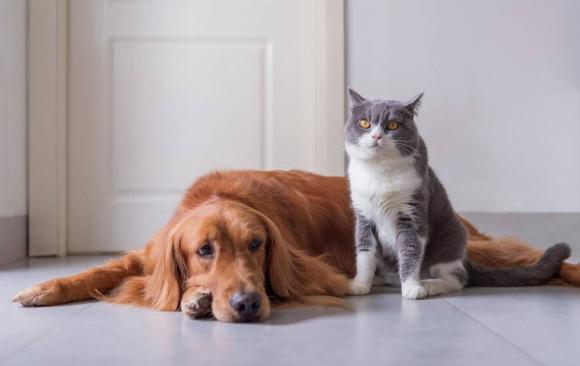COVID-19 and Animals
You might be wondering, can your pet contract the coronavirus? This is what the Center for Disease Control (CDC), thinks you need to know:
What you need to know
Coronaviruses are a large family of viruses. Some coronaviruses cause cold-like illnesses in people, while others cause illness in certain types of animals, such as cattle, camels, and bats. Some coronaviruses, such as canine and feline coronaviruses, infect only animals and do not infect humans.
Risk of people spreading the virus that causes COVID-19 to animals

The first US case of an animal testing positive for COVID-19 was a tiger at a NY zoo.
They are still learning about this virus, but it appears that it can spread from people to animals in some situations, especially after close contact with a person sick with COVID-19.
Animals that can be infected with the virus that causes COVID-19
The CDC knows that cats, dogs, and a few other types of animals can be infected with SARS-CoV-2, the virus that causes COVID-19, but they don’t yet know all of the animals that can get infected. There have been reports of animals being infected with the virus worldwide.
- A small number of pet cats and dogs have been reported to be infected with the virus in several countries, including the United States. Most of these pets became sick after contact with people with COVID-19.
- Several lions and tigers at a New York zoo tested positive for SARS-CoV-2 after showing signs of respiratory illness. Public health officials believe these large cats became sick after being exposed to a zoo employee who was infected with SARS-CoV-2. All of these large cats have fully recovered.
- Currently, there is no evidence that animals play a significant role in the spread of SARS-CoV-2 to people.
CDC, USDA, and state public health and animal health officials are working in some states to conduct active surveillance of SARS-CoV-2 in pets, including cats, dogs, and other small mammals, that had contact with a person with COVID-19. These animals are being tested for SARS-CoV-2 infection and also tested to see whether the pet develops antibodies to this virus. This work is being done to help us better understand how common SARS-CoV-2 infection might be in pets as well as the possible role of pets in the spread of this virus.
Depending on how sick your pet is, your veterinarian may recommend that your pet be isolated at home, instead of staying in the hospital. Some pets did not show any signs of illness, but those pets that did get sick all had mild disease that could be taken care of at home.
If your veterinarian recommends home isolation and you are able to care for your pet at home, follow this advice to protect yourself and others.
What to do if your pet gets sick?
- Keep your pet at home, except to get medical care
- Talk with your veterinarian regularly. Call before you take your pet to the veterinary clinic. Be sure to alert your veterinarian if your pet has trouble breathing, or if you think it is an emergency.
- While most pets appear to show only mild symptoms or no symptoms, we are still learning about how they are affected by the virus. Even if your pet appears to be feeling better, avoid the following activities until your veterinarian determines that it is safe for your pet to do so or your pet has met the guidance to end their isolation:
- Visits to veterinary hospitals, without calling the veterinarian first
- Visits to human healthcare facilities or schools
- Visits to parks (including dog parks), markets, or other gatherings such as festivals
- Visits to the groomer, including mobile grooming salons
- Visits to pet daycares or boarding facilities
- Other outings such as playdates, hikes, or visiting other homes, with or without pets
- Using dog walkers or pet-sitters that live outside your home
Separate your pet from other people and pets in your home
Research on animals and COVID-19
Research on SARS-Cov-2 in animals is limited, but studies are underway to learn more about how this virus can affect different animals.
Separate your pet from other people and pets in your home
- Avoid contact with the pet as much as possible, including, petting, snuggling, being kissed or licked, and sharing food or bedding.
- If possible, provide a separate litterbox or bathroom area from other pets.
DOGS: If you have a private backyard where your dog can go to the bathroom, do not take them for walks. If you must walk your dog, limit it to bathroom breaks only, stay close to your home, and keep your pet at least 6 feet away from other pets and people. Do not let other people touch or interact with your dog.
CATS: Cats should be kept inside. Do not allow cats that have tested positive for the virus that causes COVID-19 to roam outside.
CLEANING UP: There is no evidence to suggest that waste from infected pets needs any additional disinfection. Wear gloves when cleaning up after your pet, and place fecal material or litterbox waste in a sealed bag before disposing. Always wash your hands with soap and water immediately after cleaning up after your pet.
- Provide bedding, bowls or containers, treats, and toys that are separate from those used by other people or animals in the household.
-
- Disinfect bowls, toys, and other animal care items with an EPA-registered disinfectantexternal icon and rinse thoroughly with clean water afterwards.
- Soft items like towels, blankets, and other bedding, can be safely laundered and reused. Dirty laundry that has been in contact with an ill animal can be washed with other items.
Monitor your pet’s symptoms
It is important to keep track of your pet’s symptoms during home isolation. If you think your pet has new symptoms or is getting worse, call your veterinarian.
Pets sick with COVID-19 may have:
- Fever
- Coughing
- Difficulty breathing or shortness of breath
- Lethargy (unusual laziness or sluggish)
- Sneezing
- Runny nose
- Eye discharge
- Vomiting
- Diarrhea
Follow all care instructions from your veterinarian. Your veterinarian may have you keep a written log of your pet’s symptoms.
If your pet develops new symptoms or seems to be getting worse, including trouble breathing, you should call your veterinarian right away. Your veterinarian may be able to advise you over the phone or may tell you to bring your pet to their clinic or go to another clinic that can better care for your pet.
Protect yourself when caring for a sick pet
- Follow similar recommended precautions as for people caring for an infected person at home.
- If you are at higher risk for severe illness from COVID-19, another household member should care for the pet, if possible.
- People should wear a mask and gloves in the same room or area as the sick pet.
- Animals should not wear a mask. Do not try to put a mask on your pet.
- Use gloves when handling the pet’s dishes, toys, or bedding and when picking up feces (poop). Throw out gloves and place waste material or litterbox waste in a sealed bag before throwing away in a trashcan lined with a trash bag. Always wash your hands with soap and water immediately after cleaning up after your pet.
- Clean your hands regularly throughout the day.
- Wash hands: Wash your hands often with soap and water for at least 20 seconds each Make sure everyone in the home does the same, especially after touching the sick pet or handling their dishes, toys, or bedding.
- Hand sanitizer: If soap and water are not readily available, use a hand sanitizer that contains at least 60% alcohol. Cover all surfaces of your hands and rub them together until they feel dry.
- Do not touch your eyes, nose, and mouth with unwashed hands.
- Clean and then disinfect:
- Follow cleaning and disinfecting recommendations found on CDC’s Cleaning and Disinfecting Your Home
- Do not wipe or bathe your pet with chemical disinfectants, alcohol, hydrogen peroxide, or other products, such as hand sanitizer, counter-cleaning wipes, or other industrial or surface cleaners. There is no evidence that viruses, including the virus that causes COVID-19, can spread to people or other animals from the skin, fur, or hair of pets. Using chemical disinfectants on your pet could make them very sick or kill them. Talk to your veterinarian if you have questions about appropriate products for bathing or cleaning your pet.
When it is safe for your pet to be around others: ending home isolation
Follow your veterinarian’s advice for when it is safe for your pet to be around other people and animals. Some pets may need follow-up testing to see if they are still positive for the virus that causes COVID-19. Monitoring, isolation, and movement restrictions can end for positive pets if:
- The animal has not shown clinical signs consistent with SARS-CoV-2 infection for at least 72 hours without medical management;
AND one of the following conditions:
- It has been at least 14 days since their last positive test from a lab that uses a validated SARS-CoV-2 RT-PCR diagnostic assay;
OR
- All sample types collected at follow-up are negative by a validated SARS-CoV-2 RT PCR diagnostic assay.


